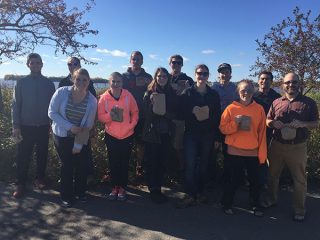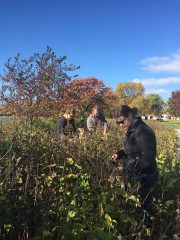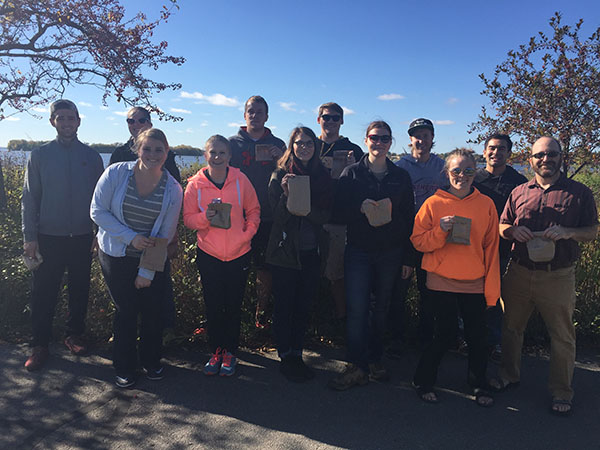The University of Wisconsin Oshkosh is a leader in sustainability and it yields students who are prepared to go out into the world and take action.
 Professor Jim Feldman’s senior seminar, an environmental class, is teaching his students what it means to implement classroom learnings into the community, make a difference and be heard. The class has spent the better part of the semester working on a shoreline restoration project for the City of Oshkosh.
Professor Jim Feldman’s senior seminar, an environmental class, is teaching his students what it means to implement classroom learnings into the community, make a difference and be heard. The class has spent the better part of the semester working on a shoreline restoration project for the City of Oshkosh.
Students like Cole Gille, a senior studying criminal justice and environmental studies, found the class expectations took a lot more research, planning and collaboration to succeed than originally predicted.
Feldman explains the goals of his class: “The students have been asked to research relevant federal, state and local laws and ordinances, conduct research on the opinion of business and community leaders and the general public on shoreline restoration efforts, explore the impact of shoreline restoration on water quality and property values, find examples of incentive programs that help encourage private residents to use native plants in restoration efforts, and do benchmarking research to see how other cities have addressed these issues.”
Feldman made sure to set the students up to succeed with community resources that would help guide them on their research endeavors.
“We met with Elizabeth Williams, who works for the city’s Planning Services Department in the beginning of the semester. Students went to Menominee Park with Michelle Bogden-Meutzel, who is the chair of the Friends of Menominee Park, and students have been talking to stakeholders in the city,” Feldman said.
“At the beginning of the semester, we focused on getting an understanding of the project and met with city officials who guided us in the right direction,” Gille said. “Whereas now, most of the responsibility of completing the project is in the hands of us students.”
 In mid-October, students participated in hands-on field work in Menominee Park. They collected seeds that might be used in other shoreline sites–these natural native plant buffer zones are significant because they trap runoff from agriculture, industry and modernized living thus resulting in cleaner water.
In mid-October, students participated in hands-on field work in Menominee Park. They collected seeds that might be used in other shoreline sites–these natural native plant buffer zones are significant because they trap runoff from agriculture, industry and modernized living thus resulting in cleaner water.
“This project is important because the City of Oshkosh has invested in storm water treatment. These buffer zones will help to improve water quality, potentially freeing up tax dollars for other improvements,” Gille said.
So much has been accomplished in the last few months, but perhaps the climax of the semester will happen Dec. 6 when the students present their finding to members of City Hall. This is the second semester that the senior seminar class collaborated with the community and submitted a proposal that will advance Oshkosh’s sustainability efforts.
“One of the proposals from last semester was that the city adopted an ordinance that would allow urban beekeeping, and the city’s Sustainability Advisory Board is moving ahead with that proposal,” Feldman said. “These future leaders are striving toward not only implementing native plant buffers along local shorelines, but also the idea of living with nature instead of fighting it.”
Learn more:

